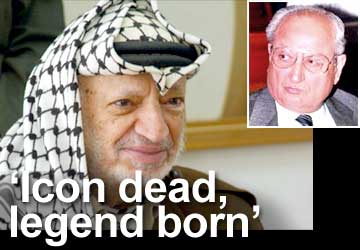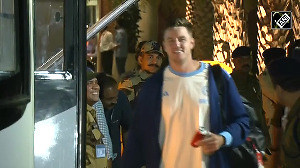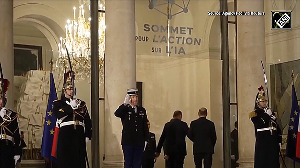
Former Foreign Secretary Romesh Bhandari was a personal friend of Yasser Arafat, and was sent by former Prime Minister Indira Gandhi several times to meet the Palestinian leader.
Their last meeting was barely three months ago, at Arafat's besieged headquarters in Ramallah, West Bank, on August 11.
Bhandari walked down memory lane with Senior Editor Sheela Bhatt:
| |||||||||||
India has always supported the Palestine movement. When Arafat created the Palestine Liberation Organisation, he became a symbol of the cause of Palestine. India always had close ties with him, particularly Indira Gandhi and Rajiv Gandhi. He was warm in personal relationships.
Arafat considered Indira Gandhi his sister! There are memorable pictures of two when he visited India to attend Non-Alignment Movement's meeting. Both had tremendous respect for each other.
Rajiv and Arafat got along very well. He loved Rajiv.
Arafat was always worried about his security. He used to talk directly with Rajiv without anyone's knowledge. The PLO has a huge intelligence network. He used to share information with Rajiv Gandhi.
He kept track of terrorist organizations all over the world. When I told him about Indians who were abducted in Iraq, he immediately told me that he would like to help. He said, "we have information network and we will find out how we can help India."
Once, I was in meeting with him in Tunisia and I got a message about my sick son. I asked him to pardon me, and took a first flight home. After two days my son died.
Arafat asked his Ambassador, who was in Tunisia, to fly immediately to India. He instructed him to not waste time but straight visit my home to convey his condolences. I was moved. When he came to India he made it a point to come home to mourn. He had magical aura around him, which attracted people.
When not on formal visits I used to call him Abu Aamar, like his supporters call him.
He is the Gandhi of the Palestine freedom movement. History will consider his role as important as Gandhi's role in India's freedom movement. His movement for the independent nation for Palestine has just begun.
The meetings with Arafat used to be quite an event. It was very difficult.
He would never give a fixed time. We were alerted just 30 minutes before the scheduled time. We were taken to him in own car. That too, on the way we would change vehicles twice. I have met him many times in Beirut and other cities, but never at same place.
In the past, he never lived at one place for more than a night. His security was unusually tight. His supporters always feared that Israelis will assassinate him. (But) He was not afraid of death.
We met many times in Tunisia too. Our nature of talks was about the future course of action of his movement. We always talked in English. Sometime he would speak in Arabic, but he would always get it translated with the help of a translator.
India always advised him to not delay the acceptance of reality of Israel. We told him that time can't be reversed. The UN resolution of 1947, which helped create Israel, is part of history. India was part of Commission which was set up by the UN. Nothing can be done about the UN resolution.
We told him that it was unrealistic to believe that all the Jews would go back to their country of origin and vacate Israel. And that that vacated land will again become Palestine is impossibility.
But it was difficult for him to believe us.
What the leading nations are saying today, India was talking about from the beginning. Acceptance of Israel and establishment of Palestine nation, both should co-exist. India has contributed a lot in this thinking.
It was wrong on part of Israel and America to brand Arafat as a terrorist. He was a very fine human. Rather, he was the only one who could exercise some form of control over radical Palestine movement like Hamas. Otherwise, who knows how much more destruction they would have caused?
After all, Palestine's hurts are deep and their pain is excruciating. Their land was given away to Israel. They became homeless. Their camps in Lebanon were destroyed without mercy. When women and children died, Palestinians asked: is it not terrorism? is it not a human rights violation to take away the land of Palestine? How is it that Israel can do whatever it wants?
These were the issues Arafat was struggling with throughout his life. He was not against Jews but he opposed Israel. He knew that for centuries Jews and Islamists have lived together. The Crusade was between Christians and Muslims.
He had to fight tough battles. First he took his people to Gaza and Ramallah. He had to struggle a lot to get something out of tough bargainers in the international arena.
He didn't know what his options were apart from bloody confrontation. What can I do if people just don't respond to injustice, he asked. How can he not oppose injustice?
He believed, like many others, that American foreign policy is decided by the Jewish lobby in Washington, and so Americans can't be neutral on this issue.
Also, he argued that Israel is a creation of America and Britain. After the First World War Balfour Declaration was signed, and this paved way for Israel. And things move conclusively when the Nazis launched their Holocaust. Jews sufferings at hands of Nazis led to the UN resolution.
I always advised him that if you feel America is not listening to you, why don't you move around in US and put forward your views vigorously? Somehow he could not do so.
Of course under no circumstances did we support violence by the PLO or anybody else. Israelis have been killed mercilessly by suicide bombers.
He understood our stand against violence. And our support to Israel on the issue because we have fought non-violent battle against British.
On August 11, I was in Jordan, and sought an appointment with him. He gave me time at 6 pm the same day. I went to West Bank, and met him for 45 minutes.
It was a lovely meeting. He was happy to talk about old days. He said he was a prisoner in his own house. He could not get out of his home in Ramallah since last two years. Israelis had bombarded his Presidential palace too. The wreckage of planes and cars and other things were still lying around.
He seemed very happy to talk about India. He said that now, China and Japan are also supporting them. NAM countries support was always with him. And even the European Union has been talking in Palestine's favour. If all the supporters come together the cause of Palestine would benefit, he felt.
"Too many are against us and too many are protesting. I tried my level best. I even conceded the road map for peace," he said.
Supporters of Palestine didn't take even a step forward to make success of 'road map to peace" which was a result of the UN resolution, he lamented. No concrete steps were being taken.
In his last days he was worried that nothing is moving much. He was ready to step forward but a response from the world community was missing. An implementation programme for the creation of the State was missing.
He said that when Cold War was on, Russia supported them and America went on to oppose them. And now the only superpower is America and without US support nothing can move. Who can fight American might?
The reality of the world is that without the superpower's response, the cause of Palestine can't move.
President Bush has wished that a secure Israel and Palestine State can live in peace together. But what will be the basis of creation of Palestine State?
Whatever territories have gone to Israel in 1967 through UN resolution should go back to Palestine. Israel is not ready for that. In that case justice will not been done.
Even today to visit Ramallah, Palestine forces don't stop you from entering, it's Israeli police everywhere. Without consent of Israel forces no Palestinian can enter Ramallah.
All these facts made Arafat unhappy. He was religious but not fanatical. He married very late in his life. Before his marriage he used to say that he is married to a cause of Palestine.
He has one child. Lately he was talked about as one of the richest men of world, but nevertheless I believe he did his best to serve his cause.
His biggest strength was the massive support he enjoyed amongst Palestinians and Arabs. Lack of response from powerful nations failed Arafat.
The icon is dead and a legend has been born.






 © 2025
© 2025